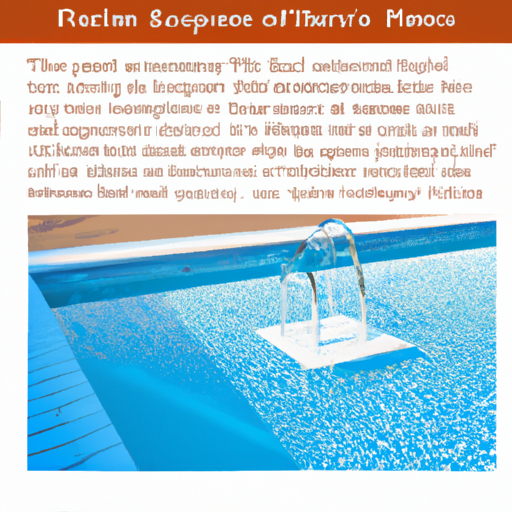Have you ever wondered how much it costs to heat a pool? You know, when the weather starts getting colder and you’re not ready to give up on swimming just yet? Well, let me tell you, it can definitely add up. Heating a pool is not just a matter of turning on a switch and voila, warm water. There are different factors to consider, such as the size of the pool, the climate you live in, and the type of heating system you choose. But don’t worry, I’m here to break it down for you and give you a better idea of what to expect.
First off, let’s talk about the size of your pool. The larger the pool, the more it will cost to heat. It’s simple math, really. More water means more energy required to heat it. So, if you have a big, Olympic-sized pool, be prepared to pay a pretty penny. On the other hand, if you have a smaller, residential pool, the costs will be more manageable.
Another factor to consider is the climate you live in. If you’re lucky enough to reside in a warm and sunny location, then heating your pool won’t be as expensive as if you live in a colder climate. In warmer areas, you might only need to heat your pool for a few months out of the year, whereas in colder areas, you might need to do it all year round. Keep this in mind when budgeting for pool heating expenses.
Lastly, the type of heating system you choose will also affect the cost. There are several options available, including gas heaters, heat pumps, and solar heaters. Gas heaters tend to be the most expensive upfront, but they can heat your pool quickly. Heat pumps are more energy-efficient but may take longer to heat the water. Solar heaters, while initially costly, are the most cost-effective option in the long run as they use the power of the sun to heat your pool.
So, there you have it. Heating a pool can be quite a financial investment, but with the right planning and the appropriate heating system, you can make it more manageable. In the upcoming article, you’ll learn more about each heating system, their costs, advantages, and disadvantages. So, stay tuned and get ready to dive into the world of pool heating! If you own a pool or are considering installing one, you may be wondering how much it would cost to heat it. Heating a pool can significantly increase your comfort and extend the swimming season, but it also comes with a cost. The cost of heating a pool is influenced by various factors, including the size of the pool, its location, the climate in which you live, the pool’s insulation, and the type of heating system you use.

Pool size
The size of your pool plays a significant role in determining the cost of heating. The larger the pool is, the more water there is to heat, and the more energy will be required to maintain the desired temperature. Determining the pool volume is the first step in understanding its size. This can be done by multiplying the length, width, and depth of the pool. Additionally, calculating the surface area helps in estimating the heat lost to evaporation.
The impact of pool size on heating costs cannot be overstated. A larger pool requires more energy to heat and maintain a comfortable swimming temperature. As a result, heating costs will be higher for larger pools compared to smaller ones.
Pool location
The location of your pool, whether it is indoor or outdoor, also affects the cost of heating. An indoor pool benefits from being shielded from the elements, which reduces heat loss. On the other hand, an outdoor pool is exposed to external factors that can impact heating costs.
Sun exposure is an essential consideration for outdoor pools. Pools that receive adequate sunlight will naturally be warmer, reducing the need for additional heating. Similarly, pools located in areas with minimal shade and wind protection will lose less heat and require less energy for heating.

Climate
The climate in which you live plays a vital role in determining the heating requirements of your pool. The average temperature and seasonal variations directly impact the amount of energy needed to maintain a comfortable swimming temperature.
In colder climates, where temperatures remain low for an extended period, more energy will be required to heat the pool. Conversely, in warmer climates, heating requirements may be minimal or even unnecessary during certain seasons.
Understanding the heating demands based on your climate is crucial in estimating the cost of heating a pool. Cold climates may require more significant energy consumption and higher heating costs.
Pool insulation
Proper insulation of your pool can help minimize heat loss and reduce the overall cost of heating. Insulation is essential for both indoor and outdoor pools, as it helps retain heat and prevents it from dissipating into the surrounding environment.
There are various types of pool insulation available, including foam boards, solar blankets, and liquid covers. Each type has its pros and cons, but the common goal is to create a barrier that prevents heat from escaping.
The effect of insulation on heating costs cannot be overstated. Well-insulated pools retain heat more effectively, reducing the need for continuous heating and ultimately lowering energy consumption.

Type of heating system
The type of heating system you choose for your pool also impacts the cost of heating. There are several options available, including solar heating, gas heating, electric heating, and heat pumps. Each system has its advantages and disadvantages, including initial costs, operating costs, and environmental impact.
Solar heating is an increasingly popular choice for pool owners as it utilizes the sun’s energy to heat the pool water. While it may have higher initial costs, solar heating can be cost-effective in the long run, as it relies on a renewable energy source.
Gas heating is another common option, especially for pools requiring quick heating. Gas heaters are often more expensive to operate than other systems, but they offer flexibility and can heat a pool rapidly.
Electric heating is a straightforward and easy-to-install option for heating a pool. However, it may have higher operating costs compared to other systems.
Heat pumps are an energy-efficient choice for heating a pool and are particularly suitable for moderate climates.
Comparing the different heating systems and considering their pros and cons is essential when estimating the cost of heating a pool.
Energy consumption and cost
Determining the energy consumption of your pool and calculating the associated heating costs is crucial for budgeting. The energy consumption depends on various factors, including the pool size, insulation, heating system efficiency, and usage patterns.
To calculate heating costs, you need to consider the energy requirements of your heating system and the duration for which it operates. This can be done by multiplying the system’s energy consumption rate by the number of hours it operates, and then multiplying this value by your electricity or gas cost per unit.
Monthly and annual heating costs can be estimated using historical weather data, allowing you to plan your budget accordingly.

Additional expenses
In addition to energy costs, there are other expenses to consider when heating a pool. Regular maintenance and repairs may be necessary to keep your heating system functioning optimally. These costs can vary depending on the type and age of the heating system.
Installation costs are another expense to factor in if you are considering installing a new heating system. The initial investment may vary depending on the type and complexity of the system, as well as any necessary modifications to your pool.
Lastly, if you have an older heating system, upgrading to a more energy-efficient option may help reduce long-term heating costs. Although there will be an upfront cost, the potential savings over time can offset the initial investment.
Energy-saving tips for pool heating
To minimize the cost of heating your pool, there are several energy-saving tips you can implement:
- Using a pool cover when the pool is not in use helps retain heat and reduces evaporation, resulting in lower heating costs.
- Optimizing your heating system settings by keeping the temperature within a reasonable range can help conserve energy.
- Utilizing solar energy by installing solar panels can provide a renewable energy source for pool heating.
- Proper insulation techniques, such as using foam boards or liquid covers, can effectively reduce heat loss and save on heating costs.
By following these energy-saving tips, you can reduce your pool heating expenses while still enjoying a comfortable swimming experience.

Conclusion
Heating a pool comes with a cost, influenced by various factors such as pool size, location, climate, insulation, and heating system type. Understanding these factors and their impact on cost is essential for planning and budgeting. By considering energy-efficient options, optimizing usage, and implementing energy-saving measures, you can minimize the cost of heating your pool while maximizing your swimming season enjoyment.
